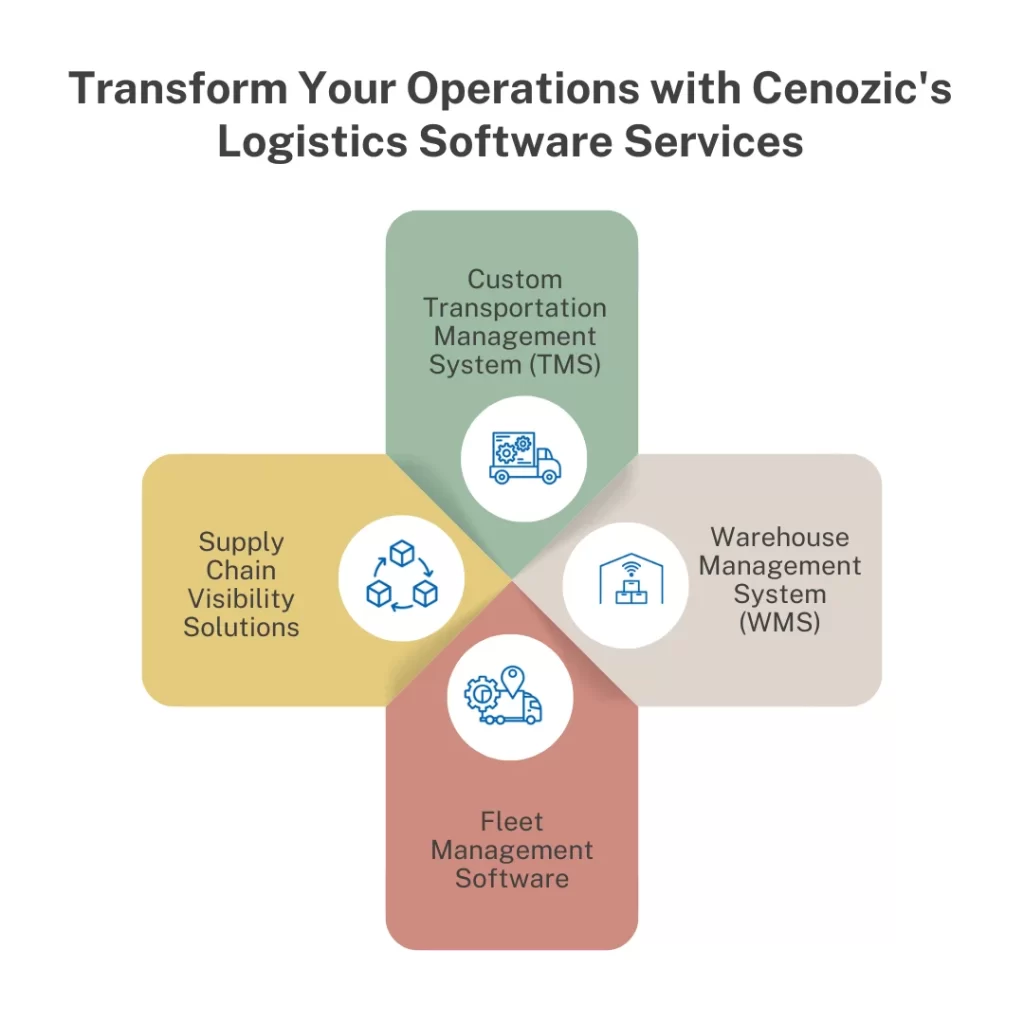In today’s fast-paced and technology-driven world, logistics has become one of the most critical components of any successful business. Efficient management of the supply chain ensures that products are delivered on time, costs are kept under control, and customer satisfaction remains high. Custom logistics software development plays an essential role in achieving these goals. It offers businesses tailored solutions that optimize their operations and significantly improve supply chain efficiency. In this blog, we’ll explore how custom logistics software development is transforming supply chain efficiency by addressing the needs of modern logistics, offering flexibility, and providing robust solutions for overcoming challenges.
Logistics software refers to applications that assist in managing, automating, and optimizing various logistical processes such as transportation, inventory management, warehouse operations, fleet management, and supply chain coordination. Custom logistics software development is unique because it is tailored to meet the specific needs of a business, addressing issues that off-the-shelf solutions may not be able to resolve.
According to Fortune Business Insights, the global logistics software market is expected to grow to $18.31 billion by 2028, at a CAGR of 8.31%, driven by the rising need for automation and digitalization in logistics and supply chain management. A report by Statista indicates that logistics companies using software solutions can save between 10-15% on transportation and delivery costs due to better routing and resource management.
With globalization, eCommerce, and customer expectations at an all-time high, businesses are increasingly turning to custom logistics software to improve efficiency, reduce costs, and maintain a competitive edge. Custom solutions empower businesses to integrate all aspects of their supply chain operations, providing real-time insights and enabling smart decision-making.
1. Optimizing Supply Chain Operations
One of the most significant ways custom logistics software is transforming supply chain efficiency is through the optimization of operations. Supply chain processes involve multiple stakeholders, from suppliers and manufacturers to distributors, warehouses, and end customers. Custom software helps businesses streamline each step of the supply chain, ensuring that every process is integrated and operating at maximum efficiency.
Automating Routine Processes
Custom logistics software automates many routine tasks, such as order processing, shipment tracking, and inventory updates. By reducing the reliance on manual data entry, businesses can save time, minimize errors, and allocate resources more efficiently. Automation also enables better workflow management, ensuring that tasks are completed on time and orders are fulfilled without delays.
Enhanced Visibility and Real-Time Data
Supply chain visibility is essential for businesses that want to stay competitive. Custom logistics software provides real-time visibility into all aspects of the supply chain, including inventory levels, transportation status, and delivery times. This visibility allows companies to monitor their supply chain performance in real time, identify bottlenecks, and make informed decisions to improve efficiency.
Inventory Management
Custom logistics software helps businesses maintain optimal inventory levels by tracking stock in real time and providing accurate demand forecasts. This ensures that businesses don’t overstock or understock products, reducing costs and improving overall efficiency. By optimizing inventory management, businesses can reduce storage costs, avoid stockouts, and ensure faster delivery times.
2. Improving Transportation Management
Transportation management is a key component of the supply chain, and custom logistics software has revolutionized the way companies manage their transportation operations. By offering robust features such as route optimization, real-time tracking, and driver management, custom software can significantly improve the efficiency of transportation processes.
Route Optimization
Route optimization is critical for reducing fuel costs, minimizing delivery times, and maximizing the use of resources. Custom logistics software uses advanced algorithms to calculate the most efficient routes for deliveries, taking into account factors such as traffic conditions, weather, and delivery windows. This not only reduces transportation costs but also ensures that customers receive their products on time.
Fleet Management
Custom software allows businesses to manage their fleet more effectively by providing real-time insights into vehicle performance, maintenance schedules, fuel consumption, and driver behavior. This helps businesses ensure that their fleet is operating at peak efficiency and reduces the risk of breakdowns and delays.
Real-Time Tracking
Real-time tracking is one of the most important features of custom logistics software. It allows businesses to monitor the location and status of shipments at every stage of the transportation process. By providing accurate delivery estimates and tracking information, businesses can enhance customer satisfaction and improve communication with both drivers and customers.
3. Enhancing Warehouse Management
Warehouse management is another critical aspect of the supply chain that can benefit from custom software development. Optimizing warehouse management is crucial for improving operational efficiency, reducing costs, and ensuring timely delivery of products. Enhanced warehouse management involves implementing advanced technologies such as automated inventory systems, barcode scanning, and real-time tracking, which streamline the storage, handling, and distribution processes.

By integrating warehouse management systems (WMS) with ERP and supply chain platforms, businesses can achieve better visibility into inventory levels, automate stock replenishment, and improve order accuracy. Efficient warehouse management also focuses on maximizing space utilization, reducing lead times, and enhancing labor productivity. These improvements not only boost overall productivity but also enhance customer satisfaction through faster, more accurate deliveries. Efficient warehouse operations are essential for ensuring that products are stored, picked, packed, and shipped efficiently. Custom software helps businesses automate warehouse processes, improve accuracy, and optimize space utilization.
Automated Order Fulfillment
Custom logistics software automates the order fulfillment process, ensuring that orders are picked, packed, and shipped as quickly and accurately as possible. By integrating with other systems, such as inventory management and transportation management, the software ensures that orders are processed efficiently and that there are no delays in shipping.
Optimized Space Utilization
Custom logistics software can analyze warehouse space and optimize the layout for maximum efficiency. This ensures that products are stored in the most accessible locations, reducing the time it takes to pick and pack orders. By optimizing space utilization, businesses can reduce storage costs and improve the overall efficiency of their warehouse operations.
Reduced Errors and Improved Accuracy
Human errors in warehouse operations can lead to costly mistakes, such as shipping the wrong products or misplacing inventory. Custom logistics software reduces these errors by automating tasks such as barcode scanning, inventory tracking, and order processing. This ensures that products are picked and shipped accurately, reducing the need for returns and improving customer satisfaction.
4. Improving Communication and Collaboration
Effective communication and collaboration are critical in the logistics industry to ensure smooth operations, timely deliveries, and seamless coordination across the supply chain. Logistics software enhances communication by providing real-time updates, automated alerts, and centralized platforms where teams, vendors, and clients can interact effortlessly. Integrated communication tools within the software allow for quick resolution of issues, better tracking of shipments, and enhanced visibility into inventory, fleet, and orders.
Collaborative features enable different stakeholders—such as warehouse managers, drivers, and suppliers—to stay aligned, reducing delays and errors. With improved communication and collaboration, logistics software helps businesses increase operational efficiency, reduce costs, and deliver exceptional customer service. From suppliers and manufacturers to distributors and customers, effective communication is essential for ensuring that everyone is on the same page and that the supply chain operates smoothly.
Centralized Communication Platform
Custom software provides a centralized platform where all stakeholders can communicate and share information. This ensures that everyone has access to the latest data and that there are no misunderstandings or miscommunications. By improving communication, businesses can reduce delays, avoid costly mistakes, and ensure that the supply chain operates efficiently.
Collaboration with Suppliers and Partners
Custom logistics software enables businesses to collaborate more effectively with their suppliers and partners. By providing real-time data and insights, businesses can work closely with their suppliers to ensure that they have the products they need when they need them. This improves the efficiency of the supply chain and ensures that products are delivered on time.
5. Customizable and Scalable Solutions
One of the main advantages of custom logistics software is that it can be tailored to meet the specific needs of a business. Custom logistics software offers businesses the flexibility to tailor solutions that fit their specific operational needs, providing a competitive edge in managing supply chain processes. With customizable features, logistics software can be designed to support unique workflows, integrate with existing systems, and address specific industry challenges, from warehouse management to fleet tracking.
Scalability ensures that as your business grows, the software evolves with it—handling increased data volumes, expanded operations, and more complex logistics requirements without compromising performance. Custom and scalable logistics solutions not only enhance efficiency and adaptability but also future-proof your business, enabling it to respond swiftly to market changes and scale operations effortlessly. Off-the-shelf software solutions often come with limitations, whereas custom solutions are designed to address the unique challenges that a business faces.
Tailored Features for Specific Needs
Custom logistics software allows businesses to choose the features that are most important to them. Whether it’s route optimization, inventory management, or warehouse automation, businesses can select the features that will have the most significant impact on their supply chain efficiency. This ensures that the software is a perfect fit for the business, providing maximum value.
Scalable Solutions for Growth
As a business grows, so do its logistics needs. Custom logistics software is designed to scale with the business, ensuring that the software can handle increased demand and complexity. Whether a business is expanding its operations, adding new warehouses, or increasing its fleet size, custom software can grow and evolve to meet the business’s needs.
6. Cost Efficiency and ROI
While custom logistics software may require an initial investment, the long-term cost savings and return on investment (ROI) are significant. Custom software helps businesses reduce operational costs, improve efficiency, and avoid costly mistakes. By optimizing every aspect of the supply chain, custom software can result in substantial savings and a faster ROI.
Reduced Operational Costs
Custom logistics software automates many manual tasks, reducing the need for additional staff and minimizing the risk of errors. By optimizing transportation routes, warehouse space, and inventory levels, businesses can reduce their operational costs and improve profitability.
Faster ROI
The improvements in efficiency, accuracy, and customer satisfaction that custom logistics software provides result in a faster return on investment. Businesses can quickly recoup the cost of the software through increased productivity, reduced costs, and improved customer loyalty.
Conclusion
As a leading logistics software development company, our custom software are revolutionizing the way businesses manage their supply chains. By offering tailored solutions that address the unique challenges of each business, custom software improves supply chain efficiency, reduces costs, and enhances customer satisfaction. From automating routine tasks to optimizing transportation and warehouse management, custom logistics software empowers businesses to stay competitive in today’s fast-paced and complex marketplace.
At Cenozic, we specialize in developing custom logistics software that is designed to meet the specific needs of your business. Whether you’re looking to optimize your supply chain, improve transportation management, or enhance warehouse operations, our expert team can deliver solutions that drive efficiency and improve your bottom line. Let us help you transform your logistics operations with cutting-edge technology and tailored solutions that make a real impact.
Key Takeaways:
- Custom logistics software offers tailored solutions for optimizing supply chain operations.
- Automation, real-time data, and enhanced visibility improve efficiency.
- Route optimization, fleet management, and real-time tracking streamline transportation management.
- Warehouse management is improved through automation, space optimization, and error reduction.
- Custom software is scalable, cost-efficient, and provides a faster ROI.
Investing in custom logistics software can provide businesses with a strategic advantage by streamlining operations, optimizing supply chain management, enhancing inventory control, and improving overall efficiency. This proactive approach can result in sustainable growth and long-term success, setting the stage for a competitive edge in the market.


 The Future of AI: How Machine Learning is Transforming Businesses
The Future of AI: How Machine Learning is Transforming Businesses  AI in E-commerce: Enhancing Customer Experience & Engagement
AI in E-commerce: Enhancing Customer Experience & Engagement  How AI-Powered Chatbots Are Revolutionizing Customer Support
How AI-Powered Chatbots Are Revolutionizing Customer Support  The Role of AI in Mobile App Development: Smarter and Faster Apps
The Role of AI in Mobile App Development: Smarter and Faster Apps  How To Choose Top Website Development Company In USA
How To Choose Top Website Development Company In USA 

